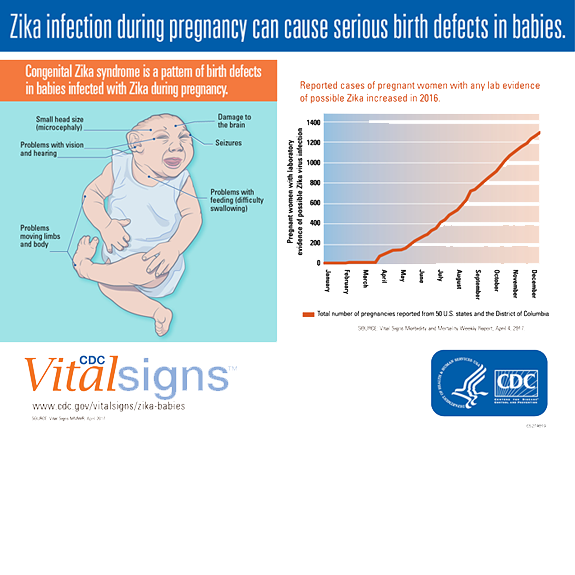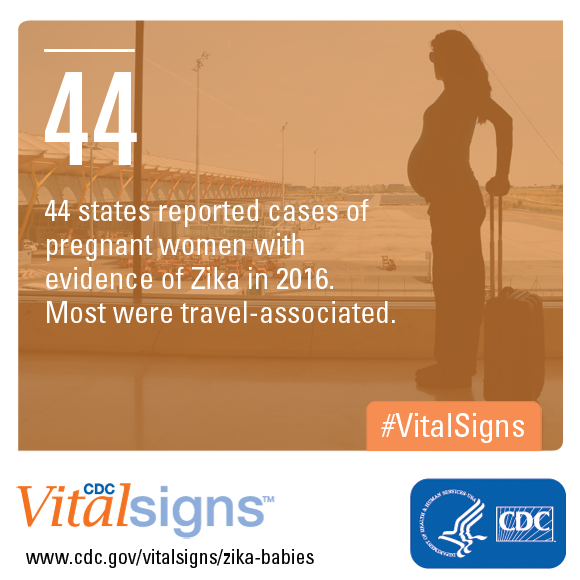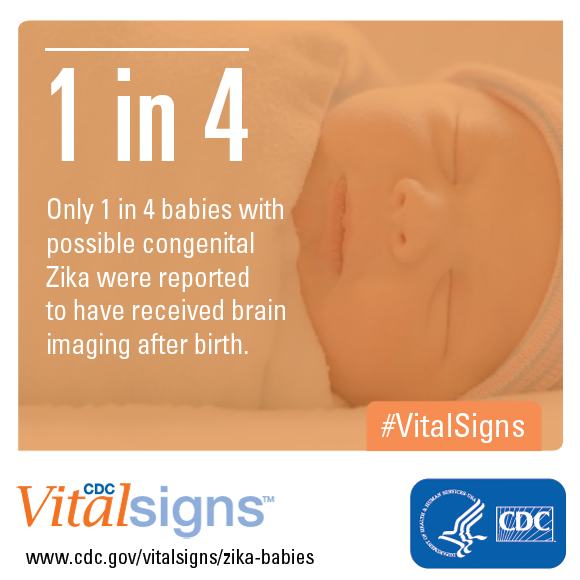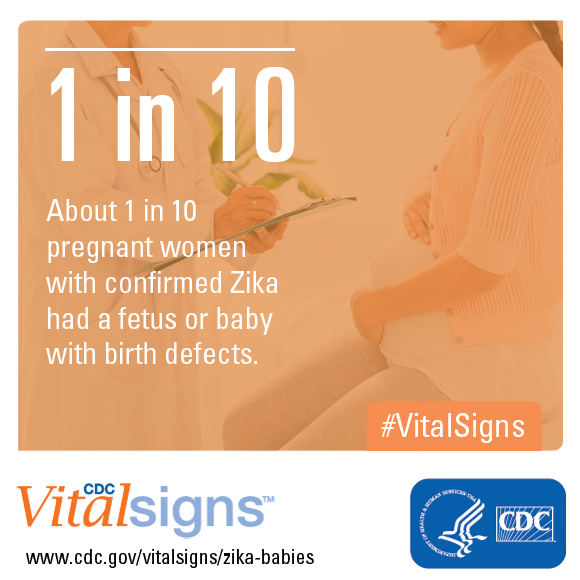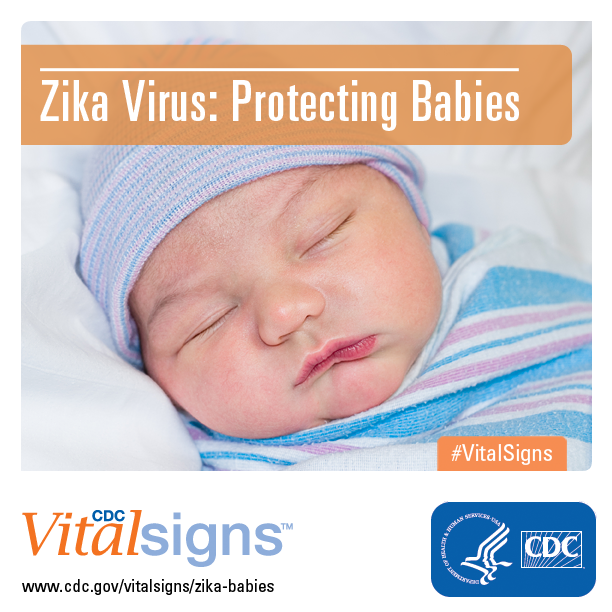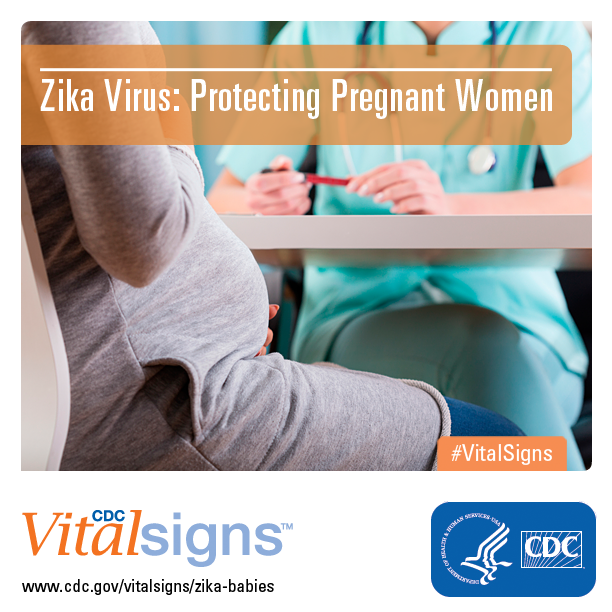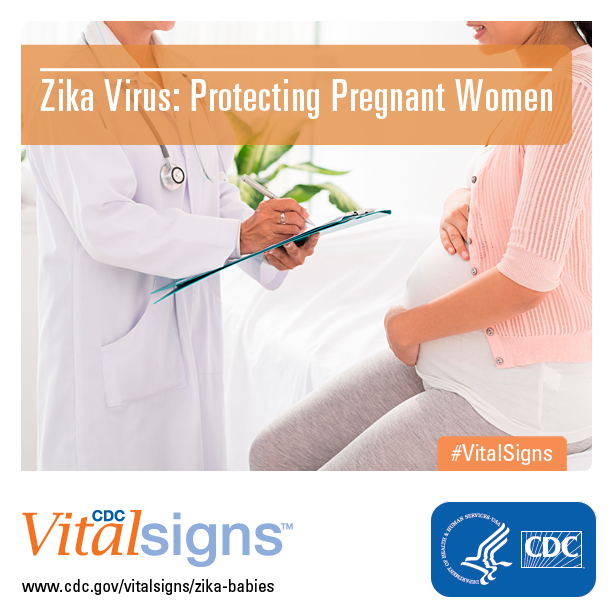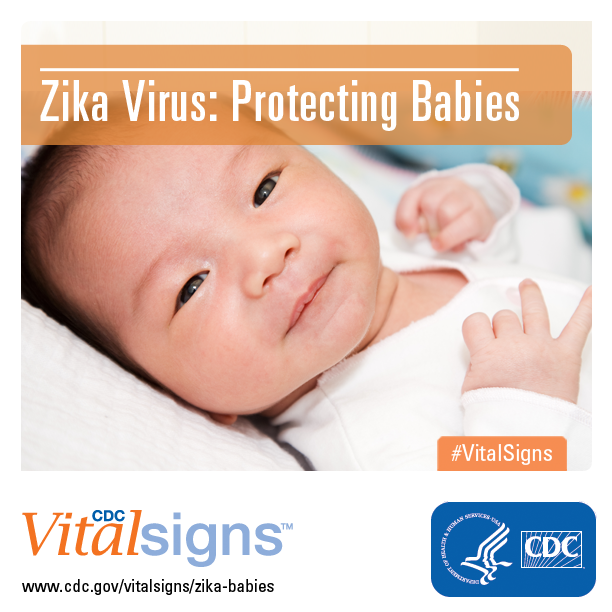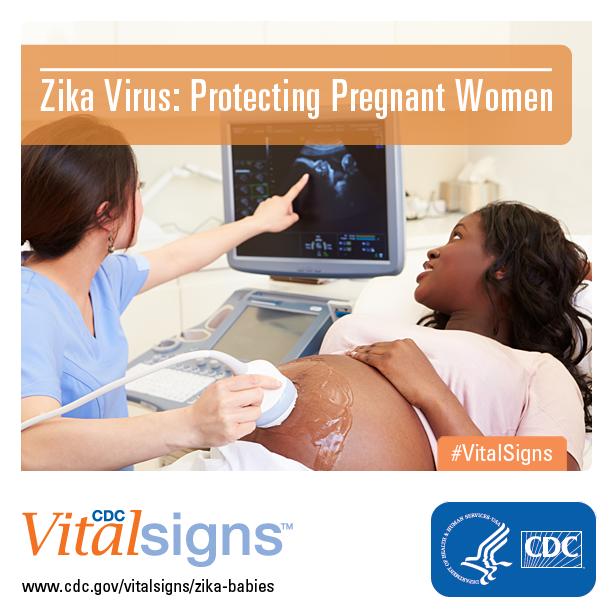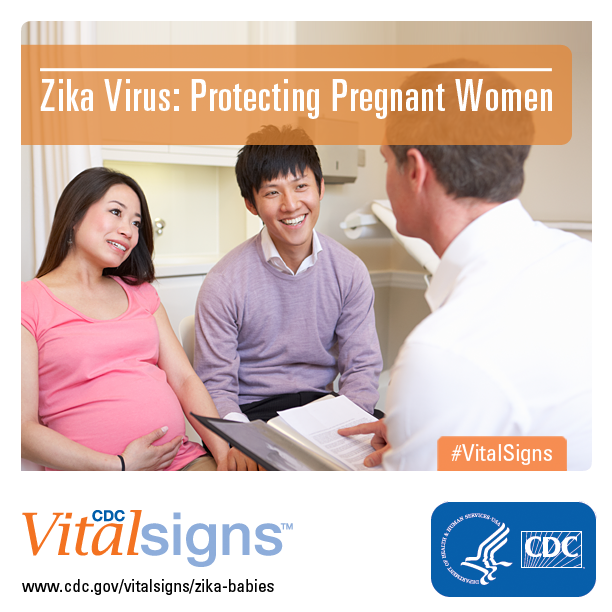Zika Virus: Protecting Pregnant Women and Babies
About 1 in 10 U.S. pregnant women with confirmed Zika had a fetus or baby with birth defects in 2016
This website is archived for historical purposes and is no longer being maintained or updated.
Zika during pregnancy can cause birth defects including damage to the brain, microcephaly, and congenital Zika syndrome. A baby with congenital Zika syndrome may experience brain abnormalities, eye defects, hearing loss, and limb defects.
The findings of this report confirm the serious threat posed by Zika virus infection during pregnancy and the critical need for pregnant women to continue taking steps to prevent Zika virus infection. The report also emphasizes the importance of healthcare providers’ role in screening all pregnant women for possible Zika virus exposure and infants born to women exposed to Zika.
Zika is a serious health threat to pregnant women and their babies in the US:
- Nearly 1,300 cases of pregnant women with evidence of possible Zika were included in the US Zika Pregnancy Registry in 2016. Most cases were travel-associated. Of that total, 250 were reported as having confirmed Zika infection.
- About 1 in 10 pregnant women with confirmed Zika had a fetus or baby with birth defects.
- About 15% of babies whose mothers were infected in the first trimester have Zika-related birth defects.
- Babies may appear healthy at birth but still have birth defects or other Zika-related health problems.
Healthcare providers can stay up–to-date on current CDC testing and follow-up guidance and develop a coordinated care plan for babies affected by Zika. They also can urge pregnant women to not travel to areas with risk of Zika, and tell men and women how to protect themselves from getting Zika through sex.
Contact Information
(404) 639-3286
media@cdc.gov
Vital Signs – Zika Virus: Protecting Pregnant Women and Babies
Factsheet:
English [PDF – 1.7MB]
Spanish [PDF 1.7MB]
Spokespersons
Anne Schuchat, MD

“Zika virus can be scary and potentially devastating to families. Zika continues to be a threat to pregnant women across the US. With warm weather and a new mosquito season approaching, prevention is crucial to protect the health of mothers and babies. Healthcare providers can play a key role in prevention efforts.”
Anne Schuchat, MD – Principal Deputy Director of Centers for Disease Control and Prevention; Rear Admiral, U.S. Public Health Service; EIS Officer, Class of 1988
Denise J. Jamieson, MD, MPH, CAPT, USPHS

“Testing and follow-up guidance may continue to change as more is learned about Zika virus. Healthcare providers play a key role in the clinical care of pregnant women and babies. It is critical that they to stay up-to-date on changes to the guidance in order to provide pregnant women and babies affected by Zika with the best care possible.”
Denise J. Jamieson, MD, MPH, CAPT, USPHS – Incident Manager CDC Zika Virus Response
Margaret (Peggy) Honein, PhD, MPH

“CDC recommends that babies born to mothers with Zika during pregnancy undergo a comprehensive physical exam, including brain imaging, neurologic exam, newborn hearing screening, and Zika laboratory tests. Referral to follow-up care and ongoing monitoring may help identify health problems that babies with congenital Zika syndrome may face and ensure they receive the care and support they need.”
Margaret (Peggy) Honein, PhD, MPH – Co-Team Lead, Pregnancy and Birth Defects Team, 2016 CDC Zika Virus Response Team
Related Links
- Press Release: About 1 in 10 U.S. pregnant women with confirmed Zika had a fetus or baby with birth defects in 2016 – English | Spanish
- Media Releases: Press Release | Media Advisory
- Vital Signs Issue details: Zika Virus, Morbidity and Mortality Weekly Report (MMWR)
- Vital Signs: Home | April 2017 Vital Signs | Topics
- Vital Signs: (Spanish) Home | 2017 Abril – Signos Vitales | Topics
- CDC Zika Website
- CDC: Build a Zika Prevention Kit
- CDC Zika Virus: Symptoms, Testing, & Treatment
- CDC Zika Virus: Zika and Sexual Transmission
- CDC Zika Virus: Pregnancy
- CDC Zika Virus: Parents
- CDC Zika Virus: Microcephaly & Other Birth Defects
- CDC Zika Virus: For Healthcare Providers
- CDC Zika Virus: Reporting and Surveillance
- CDC Zika Virus: Areas with Zika
- Vital Signs – Zika and Pregnancy
- MMWR Zika Reports
- Update: Interim Guidance for the Evaluation and Management of Infants with Possible Congenital Zika Virus Infection — United States, August 2016. MMWR
- Update: Interim Guidance for Health Care Providers Caring for Pregnant Women with Possible Zika Virus Exposure — United States, July 2016.
- CDC Travelers’ Health: Zika Travel Information
- MedlinePlus – Zika Virus
- American Congress of Obstetricians and Gynecologists — Zika Virus: Guidance and Information for Health Care Providers
- American Medical Association: Zika Virus Resource Center
- March of Dimes: Zika
- Association of State and Territorial Health Officials: Zika Virus
- American Academy of Pediatrics – Zika Virus: What Parents Need to Know
- American Congress of Obstetricians and Gynecologists: Zika Virus Resource Summary for Ob-Gyns and Health Care Providers
- Vital Signs – Zika virus [PODCAST – 75 seconds]
- Vital Signs – Zika virus [PSA – 60 seconds]
- Page last reviewed: April 4, 2017 (archived document)
- Content source:



 ShareCompartir
ShareCompartir
